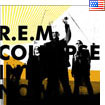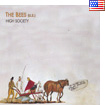Wednesday, April 03, 2013
Either Way
Antes de irme al trabajo esta mañana, se me presentaron dos noticias no relacionadas (¿?) en las que personas que trabajaron directamente con Steve Jobs—y muy influyentes ellos mismos—de algún modo terminaron compartiendo puntos de vista muy opuestos respecto a cómo creen que deben funcionar las organizaciones. | Before I left for work this morning, I was presented with two unrelated (?) news stories where people who worked directly with Steve Jobs—and highly influential themselves—somehow ended up sharing very opposing views on how they thought organizations should be run. | |
Primero, mientras desayunaba, di con una nota en un blog que hacía referencia a una nueva entrevista con Alan Kay, a quien se le acredita con ser uno de los inventores de la interfase gráfica a la que estamos más acostumbrados en computadoras: menús, botones, íconos, ventanas reposicionables, un apuntador controlado por un ratón, etc. Hacia el final de la entrevista, le preguntan acerca del tiempo que trabajó en Apple y Disney, y dice esto: | First, while having breakfast, I came upon a blog post that referenced a new interview with Alan Kay, who is credited with being one of the inventors of the graphical computer interface we are most familiar with: menus, buttons, icons, movable/resizable windows, a pointer controlled by a mouse, etc. Towards the end of the interview, they ask him about his time working at Apple and Disney, and he says this: | |
“Una manera de ver todas estas organizaciones es darse cuenta de que si requieren a un líder carismático que le dará un tiro en la rodilla a las personas cuando sea necesario, entonces la organización y el proceso corporativo es un fracaso. Quiere decir que ningún grupo puede generar una buena idea y hacerla prosperar sólo porque es una buena idea. Todas las compañías para las que he trabajado tienen este profundo problema de ‘devolucionar’ hacia algo parecido a las culturas de caza y recolecta de hace 100,000 años. Si los negocios pudieran encontrar una manera de inventar la ‘agricultura’ podríamos re-ensamblar al mundo juntos y todos prosperarían.” | “One way to think of all of these organizations is to realize that if they require a charismatic leader who will shoot people in the knees when needed, then the corporate organization and process is a failure. It means no group can come up with a good decision and make it stick just because it is a good idea. All the companies I’ve worked for have this deep problem of devolving to something like the hunting and gathering cultures of 100,000 years ago. If businesses could find a way to invent ‘agriculture’ we could put the world back together and all would prosper.” | |
Más tarde, como casi todas las mañanas, estaba escuchando el podcast de la BBC, 'World Service Global News' mientras me duchaba, e incluyeron una entrevista de 5 minutos con Nolan Bushnell, el fundador de Atari y podría arguirse el primer jefe de Steve Jobs. En algún momento, él dice esto: | Later, like most mornings, I was listening to the BBC World Service Global News podcast while I was in the shower, and they included a 5-minute interview with Nolan Bushnell, founder of Atari and arguably Steve Jobs’ first boss. At some point, he says this: | |
“Ahí es donde creo que las corporaciones de Estados Unidos—las corporaciones del mundo—están errando. Creo que están obsesionados con ‘llevarse bien’, todos tratando de ser ‘rá-rá/kumbayá’. Las buenas compañías tienen algo de espinoso, algunos miembros atípicos, algunas personas con el pelo azul, algunas personas que son las que siempre saben más que los demás, y en realidad saben más que los demás. A menudo cuando las personas te recuerdan que saben más que los demás, es chocante. Pero a la hora de la verdad, esas son las personas que te sacan de problemas.” | “That’s kind of where I believe corporate America—corporate World—is getting it wrong. I think they are infatuated with ‘getting along,’ everybody being, ‘rah-rah/Kumbayah.’ Good companies have a little spikiness to it (sic), some outliers, some people with blue hair, some people that are always the smartest person in the room, and in fact are the smartest person in the room. Often when people remind you that they’re the smartest person in the room, that’s off-putting. But when the chips are down, those are the people that get you out of trouble.” | |
(Oprime el botón para escuchar la entrevista completa.) |  | (Press the button to listen to the full interview.) |
Entonces, ¿cuál es o qué? ¿Acaso la respuesta es, como lo es casi siempre, “depende”? Esto me recordó, por supuesto, la canción de Wilco Either Way, que termina con la letra, “Trataré de entender/Todo tiene su plan/Sea lo uno o sea lo otro” Wilco - Either Way | So, which one is it? Is the answer, as it almost always is, “it depends”? This, of course, reminded me of Wilco's song Either Way, which ends with the lyrics, “I will understand/Everything has its plan/Either way” Wilco - Either Way |
Comments:
Post a Comment











































































































